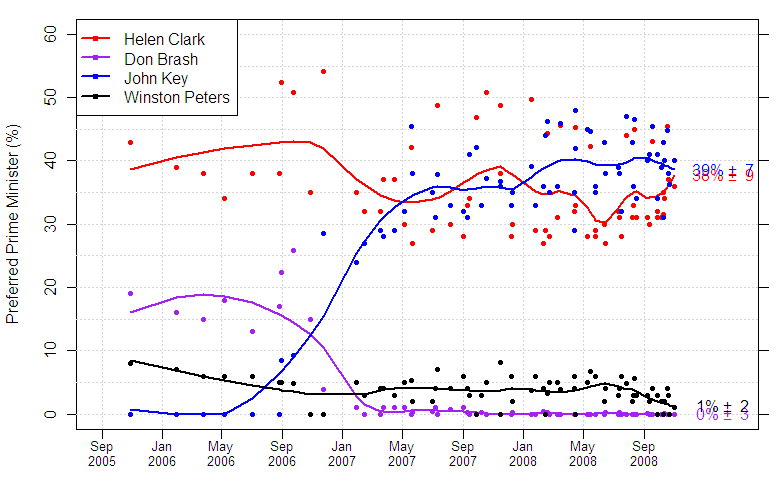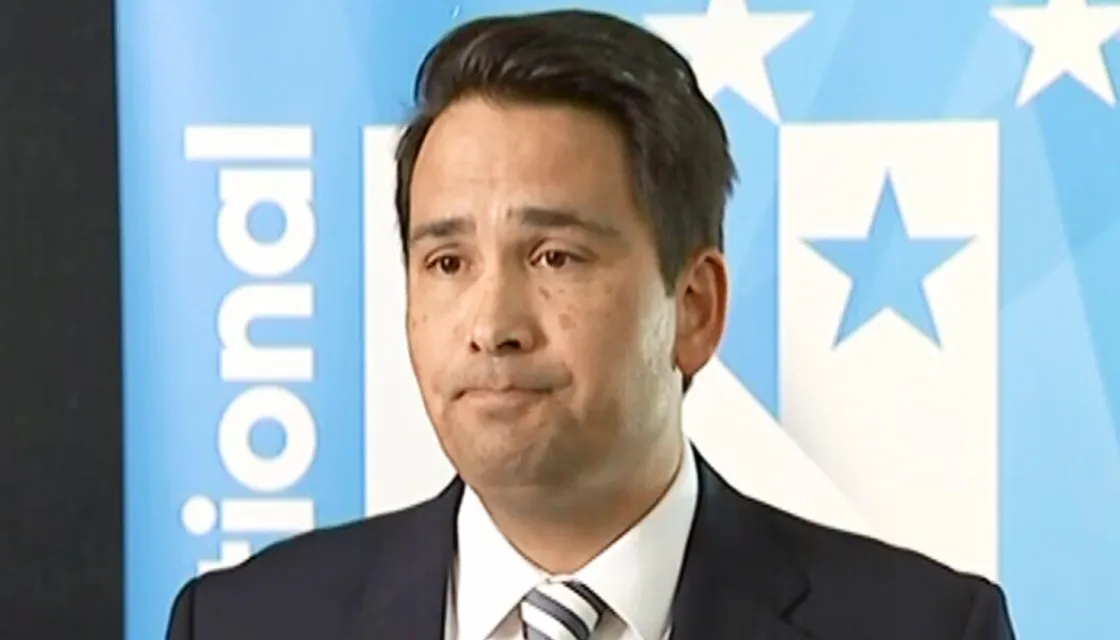You know you are screwed when the former leader’s mouthpiece and a pal of your deputy write articles about your imminent demise.
John Armstrong has done precisely that:
There are no attractive scenarios for the Opposition after a calamitous week from Bridges.
Simon Bridges has to go. The moment has surely arrived to call time on his leadership of the National Party.
But will he go? And will he do so willingly? If not willingly, is there anyone in National’s parliamentary ranks in possession of both the qualities and qualifications required of a leader? Who in addition has the gumption to force the issue and the guts to do battle with the incumbent?
The answer to that latter question has to be an emphatic and unqualified “no”. Were there an MP in National’s caucus who fitted that bill, Bridges would have been looking for a career switch many months ago.
Todd Muller’s wet team have bottled it. They counted and saw that someone else had more than them. Their numbers are well short of the 28 votes they need to topple Bridges. Mark Mitchell and Paula Bennett have barely got 10 supporters between them and they are there out of fear rather than loyalty.
Armstrong then shows his colours:
Please don’t recite the words “Judith Collins” in response to that latter question. The exercise at hand is about how National might best tackle the party’s current crisis — not the creation of a new even bigger and more fraught one.
More about his wonky thinking on that score later, but suffice to say he is merely echoing his former political master rather than applying any critical thinking.
He goes on to outline how a coup might be conducted. Strangely, he never mentions his other pal Paula Bennett, but it becomes obvious from his article that he is clearly supporting the wets.
In order to find a pathway through the party’s conundrum, it is worth canvassing the possible scenarios which might present themselves in the party’s hour of need. They are not necessarily solutions, however.
First, National’s caucus could stick with the status quo. Taking the “do nothing” option and retaining Bridges as leader would mean a miracle of Biblical proportions would be required for the party to return to power. A far more likely scenario is that National will find itself on the receiving end of a thrashing of severe magnitude when September’s election rolls around.
Should the caucus choose to stick with this strategy, which isn’t a strategy, it would be advisable for it to bend down on its collective knees ASAP and start praying for divine intervention.
He’s right on that count. If the caucus were to do that, they are condemning National to a likely two extra terms in opposition, a much diminished caucus and the loss of some competent MPs. Rebuilding takes a lot of time, but that is what would be needed.
Regardless of whether or not unsourced rumours that some MPs are poised to mount a coup against him have any basis, you can be very sure of one thing, there will be a lot of talk going on. Though that might not result in much discernible action.
The pluses and minuses of ditching Bridges will have been canvassed to the point of exhaustion by the other 54 current members of the parliamentary wing of the main Opposition party.
Recent unpublished polls have registered a collapse in voter backing for National down to the level of 35 per cent. Were that percentage to be replicated in September’s ballot, as many as 14 current National MPs would be hunting for a new job.
Those who survived the triennial ballot and made it back to Parliament would be staring at a further three years on the Opposition benches.
More like six years. That is how long it took to recover from the disastrous Bill English and Michelle Boag led campaign of 2002.
It seems ridiculous to cite Bridges’ now infamous, yet innocuous post on Facebook as reason to dump him. There can be no ignoring the fact, however, that his mild criticism of the Prime Minister provoked a backlash on a scale which beggars belief.
True, you can question the validity of many of the thousands upon thousands of overwhelmingly negative reactions to that post. You can question how many of those claiming to be National voters while simultaneously lashing Bridges actually fitted that bill.
For all that, the number and tone of the responses would have told National’s MPs what they have long known but have been reluctant to admit. It was irrefutable evidence that National cannot win an election with Bridges as leader.
Again, that is true. Bridges is electoral poison. His scoring is below that which saw the end of Phil Goff, David Shearer and David Cunliffe.
If panic hasn’t yet broken out in that quarter, it darned well ought to be doing so. There is instead paralysis — or at least the appearance of such.
The notion that Bridges be allowed to stay on and fight the election might seem logical to those on the outside of the political tent. Under such a scenario, Bridges would take a hit for the team and then be swiftly replaced after the election.
Such defeatism is not part of a politician’s makeup, however. The prevailing ethic is deliver the goods today or you will die tomorrow.
Staying on and losing sets the narrative that National are losers. Staying on and losing sets the party back years, especially if it is a drubbing. This isn’t cricket, there is no such thing as an honourable fighting draw. Politics is a binary game, win or lose. Government or opposition. Plus a good many of pretenders for the throne would also be out of parliament, no longer in the game.
The second scenario has those MPs who have concluded that Bridges must be dumped before he does any more damage to the party draft a letter addressed to him stating they have lost confidence in his leadership and requiring he resign forthwith.
Such a letter would require the signatures of a sizeable majority of MPs, most crucially the bulk of senior MPs with seats on the party’s front bench in Parliament. If there were doubts whether such an incipient rebellion had the numbers to carry a motion in the emergency caucus meeting which would have to be called to resolve matters one way or other, Bridges could deploy what might be termed The Helen Clark Option.
This is a good option, the best bet is to garner the support of those with nothing to lose. Like Nick Smith and all those retiring plus a few low-level backbenchers. Nick Smith has already poked his head up, will any more? Bridges doesn’t have the grit of Helen Clark to stare down a coup. He’s a petulant and vindictive child and will react accordingly.
Bridges might likewise choose not to go peacefully — or at least leave that threat hanging in the air. About the last thing National would want to happen would be for the transition to new leadership to be racked with infighting and dissent — especially during times of national crisis.
A third scenario would see Bridges demanding that those who want him gone put up or shut up. It would be his attempt to end the not-so-spasmodic speculation and rumour of a coup being just around the corner.
Doing so would be a mistake, however. Such attempts to display strength instead tend to expose just how weak a position a leader is really in.
Todd Muller and Judith Collins would likely say ‘alright then, let’s have a crack’.
Now here is where Armstrong gets silly. He just couldn’t help himself and shows why he is on the reserves bench these days:
Under a fourth scenario, Bridges would step down without fuss or fight and be replaced by a relative unknown, such as Todd Muller or Mark Mitchell. That might avert a thrashing, but National would still lose the election and likely still by quite some margin.
It would make no difference to the question of who would end up governing the country.
The near-universal consensus would currently be that the election has become one for Labour to lose rather than for National to win.
Thanks primarily to Ardern, Labour now looks unbeatable.
A fifth scenario would see the caucus go for broke and install Judith Collins as leader. She is a potential game-changer, no question. But she is barely more popular than Bridges. She might well change the game, but not in a manner National would want.
During his two years-plus tenure in his prized position, Bridges has consciously shifted National markedly to the right in terms of ideology. That might yet turn out to have been one of his bigger mistakes. By example, with unemployment set to skyrocket to heights not registered since the 1930s due to circumstances way beyond the ordinary punter’s control, there is going to be little political market for beneficiary-bashing.
Putting someone regarded as being further to the right than Bridges in charge of National’s show does not sound like the brightest of ideas.
It is Armstrong who is presenting not the brightest of ideas. On the one hand, he suggests that Judith Collins barely rates as a leadership contender but then suggests two other candidates who don’t even rate at all. Mark Mitchell is just showing his work history of following dogs and no one has heard of Todd Muller. Yet Armstrong thinks they would do a better job than someone who has the support of the paying members of the party and a goodly chunk of the voting public.
Disasters need strong leaders, Todd Muller isn’t one of those. He prevaricated for years about standing because he shied away from a fight. He only entered parliament when he could get a sure thing sorted.
The leadership of the National Party is worth 25 points in the Preferred PM stakes. If Bridges was to have a chance of winning an election he would need to be close to Jacinda Ardern in popularity. It wasn’t until John Key took over that he passed Don Brash.

In summary, the above scenarios are the ones National is likely to encounter in the run-up to the election. There may well be others but they will be no more attractive. Thus the indecision. The stalemate cannot continue. If it isn’t broken, then National risks limping through the election campaign with a lame-duck leader going head-to-head with an opponent who is now in full and glorious flight.
The election looks like being no contest. The onus is consequently on Bridges to at least think about volunteering his resignation as leader. The caucus could choose not to accept it. Bridge’s’ colleagues might regard the sanctioning of his exit as a “least worst” option and one they cannot or should not refuse. Which is why he is unlikely to do the cent thing.
So onwards limps National along a latter-day Road to Nowhere.
John Armstrong is mostly right but ruins his analysis with his slavish following of Bill English’s hatred of Judith Collins.
National’s caucus has to do something. To retain Bridges is just a long slow suicide.
If you enjoyed this BFD article please consider sharing it with your friends.









